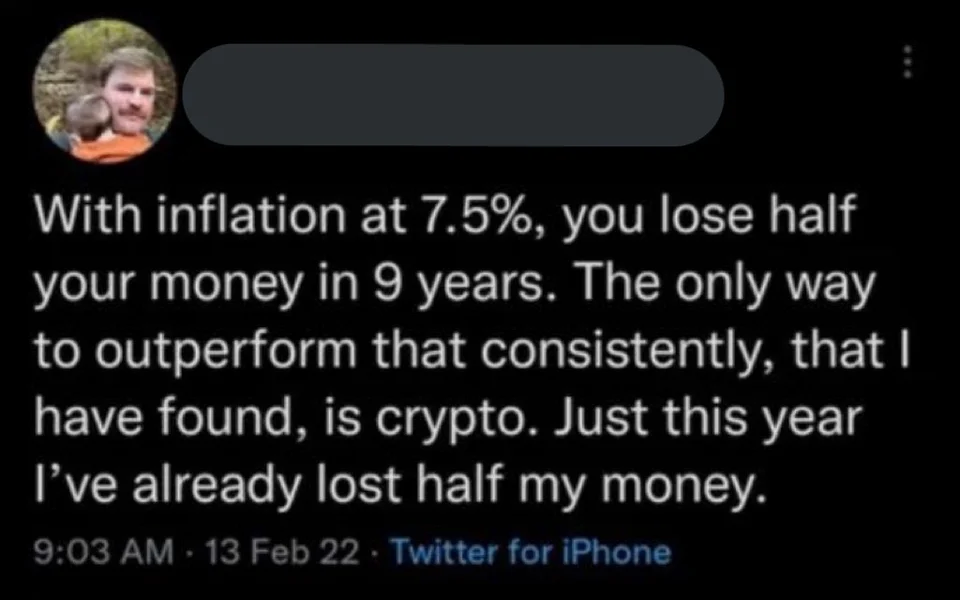this post was submitted on 04 Dec 2023
1726 points (98.5% liked)
Microblog Memes
9178 readers
1934 users here now
A place to share screenshots of Microblog posts, whether from Mastodon, tumblr, ~~Twitter~~ X, KBin, Threads or elsewhere.
Created as an evolution of White People Twitter and other tweet-capture subreddits.
Rules:
- Please put at least one word relevant to the post in the post title.
- Be nice.
- No advertising, brand promotion or guerilla marketing.
- Posters are encouraged to link to the toot or tweet etc in the description of posts.
Related communities:
founded 2 years ago
MODERATORS
you are viewing a single comment's thread
view the rest of the comments
view the rest of the comments

"Security" is kind of a loaded term, implying that you're relying on the efforts of a company to make the value go up, "Digital asset" is probably more accurate. IMO the "store of wealth" value proposition does make some sense, so long as Bitcoin retains the #1 spot in terms of name recognition. It's like gold, it doesn't have to be very useful in itself, it just has to be an effective and popular way to hoard wealth, and it has a lot of useful properties for that despite its flaws.
Which is the real problem with Bitcoin and all other crypto. It props up the capitalist system ruining the planet.
I think it's a little more nuanced, but that is the biggest concern I personally have about crypto; once it engulfs more of the financial system it could potentially make it harder to use redistribution to resolve the problems of wealth inequality, by being somewhat beyond the reach and control of the state. That said, our system of debt based fiat currency is itself an engine driving wealth inequality and the worst abuses of capitalism. Just about every dollar in existence is owed by someone somewhere back to the federal reserve, and they and everyone they have employed with their borrowed capital is obligated to claw it back and more by any means. Monetary policy is often explicitly intended to do things like suppress wages. Cryptocurrency poses a clear threat to the dollar, which could possibly do more good than harm, but I'm on the fence about it in that respect.
In other words, after you average out short term volatility, bitcoin's price reflects quite directly its brand value and nothing else.
If we're talking about its price relative to other cryptocurrencies I would say mostly yes. Its price relative to other wealth assets also reflects the utility for that purpose cryptocurrencies generally have. Like, a lot more liquid than real estate, a lot easier to store, confirm authenticity, and transfer internationally than gold, easier to hide and smuggle than stocks, etc.
Well, I would say the utility value of those qualities is well offset by its problems, such as way less market sized than pretty much every main asset class (it's only more liquid than realestate for fast in-and-out trading of smaller values, but less liquid than even realestate for large trades - because large trades that would barelly move the realestate market can massivelly move the crypto market - or even things with much smaller market sizes than realestate, such as most individual corporate stocks and the latter are actually faster to trade than Bitcoin because the stock exchange systems are way faster ) as well as its ridiculous gamma - i.e. volatily - (worse than stocks and almost at the level of derivatives such as Futures) and hence horrible risk profile for holding wealth (but wonderful for day-trading) and any professional trader will take that price risk into account when calculating the value of such an investment (and in my experience in the Industry and in derivative pricing, stuff with high gamma needs to yield massive returns to be worth the risk of holding over longer than a few days unless you can find something else with a negative price movement correlation to offset that risk)
In summary, as a Financial Asset for holding wealth, its only "reliable" value is its price's positive correlation to brand recognition, though it's a wonderful asset for speculative trading thanks to that massive volatility and all the wonderfull possibilities to make money from the movement itself on both the long and the short side (the people I know who reliably make money from crypto currencies without actually setting up crypto scams, do it exactly via speculative trading of it in short time frames).
I think it is reasonable to expect those two issues (volatility, market depth) to resolve themselves over time as crypto becomes more established. The trend has already been consistently in that direction. The only thing stopping deep pocketed market makers from mostly resolving the latter right now is the current regulatory hostility.